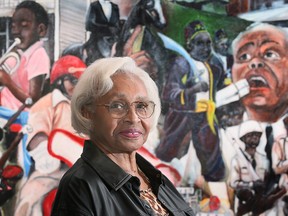
Article content
A petition calling on the Canadian government to apologize for its role in Black slavery has captured renewed attention after a local member of Parliament tabled it in the House of Commons.
Local activist Elise Harding-Davis, a historian and consultant on African-Canadian heritage, launched the petition in February 2023 in her years-long quest for an official apology from the government.
Article content
At the time, Harding-Davis told the Windsor Star she was working with an unnamed member of Parliament to present the petition to the House of Commons.
Her wishes became a reality on March 19 when MP Brian Masse (NDP — Windsor West) delivered a virtual statement to House of Commons members.
“I’m not usually one to cry, but I cried,” said Harding-Davis.
“It’s been such a long time getting to this point. I have wanted to get an apology for slavery since I was a little girl.
“There were thousands of Black spirits in that room who have followed me. I took the responsibility of dedicating a good part of my life to promoting an apology for slavery.
“I felt joyful for them, because its not about me, it’s about the people who were enslaved in this country, who never got a chance to live the good life that I do.”
Advertisement 2
Article content
Since outsiders are not allowed to address the House directly, they can enlist the help of a member of Parliament to present their petition. This allows individuals to directly engage with the legislative process.
“These petitioners are calling on the Government of Canada to finally do the right thing and apologize to Black Canadians for their centuries of mistreatment and racism in Canada,” Masse said to House members during a video call Friday afternoon.
“I thank Elise Harding-Davis for bringing this petition forward.”
As of Tuesday morning, Harding-Davis’s online petition had amassed almost 2,100 signatures since launching last year.
Prior to that, she had penned numerous letters to the prime minister, seeking an apology for Canada’s 200-year part in Black slavery.
“The climate of the day makes me hopeful that we’ll get that apology,” Harding-Davis told the Star.
“I think that the government would be wise to make the apology. Because we’ve always been looked at as a country where people found their freedom, where people could quietly live the lives that they wanted to live.
Advertisement 3
Article content
“Giving an apology would start to heal a lot of the animosity.”

Chattel slavery was a system that existed in colonial Canada since 1743, which allowed people deemed legal property to be bought, sold and owned forever.
According to the Canadian Museum of History, the historian Marcel Trudel recorded about 4,200 slaves in Canadian territory between 1671 and 1834 — the year slavery was abolished in the British Empire.
However, conditions did not improve for Black Canadians following the abolition of slavery in Canada, Masse said, rather it “perpetuated” systemic racism for future generations.
The petition calls on the government to acknowledge these generational inequalities.
“Following the Slavery Abolition Act in 1834, and after the Dominion of Canada was created in 1867, this systemic racism continued, thereby perpetuating and practicing discriminatory beliefs in society, institutions, organizations and legislation which treated Blacks as marginalized inferiors,” Masse said.
Recommended from Editorial
Once a petition is presented in the House of Commons, it’s typically referred to the appropriate committee for further consideration. The committee might opt to investigate the issues raised, and depending on their findings, propose recommendations to address the concerns.
“An apology would help so much,” Harding-Davis said.
“It’s the decent thing to do, and it’s the right thing to do.”
Article content





